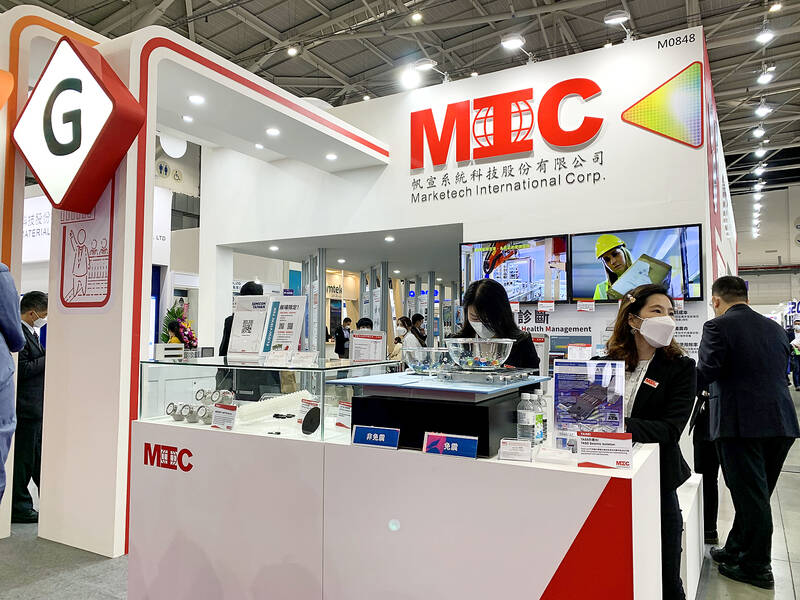Marketech International Corp (帆宣), a semiconductor and display panel equipment supplier and distributor, yesterday said it is to launch a subsidiary in Dresden, Germany, as its major customer, Taiwan Semiconductor Manufacturing Co (TSMC, 台積電) last month announced it is building its first European fab in the area.
TSMC is constructing a 12-inch wafer fab in Dresden to produce mainly car chips. The world’s largest contract chipmaker plans to build three advanced fabs in Arizona and two in Kumamoto, Japan.
Marketech has set up US and Japan subsidiaries to provide services to TSMC in those countries. It also set up an office in the Czech Republic last year to collect information about the local investment environment.

Photo: Grace Hung, Taipei Time
Marketech plans to hire about 125 employees in Europe — about half the size of its US subsidiary, company president Scott Lin (林育業) said yesterday.
The US subsidiary remains in the red due to higher labor costs, he said.
The company has slowed down the construction of a new factory in Tainan due to weaker-than-expected demand from display panel customers, he said.
Lin added that the company expects the NT$1.9 billion (US$59.2 million) Tainan factory would become operational in the second quarter of next year.
Marketech’s revenue in the first seven months of the year grew 10.42 percent annually to NT$34.92 billion.
The company expects revenue and net profit to show moderate growth in the second half of the year, Lin said.
However, the company projects more marked growth in revenue and profit next year, given an expected more solid recovery in the semiconductor industry and the contribution of the new product lineup, he said.
Marketech is planning to tap into the advanced packaging industry by supplying chip-on-wafer-on-substrate (CoWoS) equipment, he said.
It is collaborating with a Japanese company to offer CoWoS equipment from next year, he added.

Taiwanese suppliers to Taiwan Semiconductor Manufacturing Co. (TSMC, 台積電) are expected to follow the contract chipmaker’s step to invest in the US, but their relocation may be seven to eight years away, Minister of Economic Affairs J.W. Kuo (郭智輝) said yesterday. When asked by opposition Chinese Nationalist Party (KMT) Legislator Niu Hsu-ting (牛煦庭) in the legislature about growing concerns that TSMC’s huge investments in the US will prompt its suppliers to follow suit, Kuo said based on the chipmaker’s current limited production volume, it is unlikely to lead its supply chain to go there for now. “Unless TSMC completes its planned six

Power supply and electronic components maker Delta Electronics Inc (台達電) yesterday said second-quarter revenue is expected to surpass the first quarter, which rose 30 percent year-on-year to NT$118.92 billion (US$3.71 billion). Revenue this quarter is likely to grow, as US clients have front-loaded orders ahead of US President Donald Trump’s planned tariffs on Taiwanese goods, Delta chairman Ping Cheng (鄭平) said at an earnings conference in Taipei, referring to the 90-day pause in tariff implementation Trump announced on April 9. While situations in the third and fourth quarters remain unclear, “We will not halt our long-term deployments and do not plan to

‘SHORT TERM’: The local currency would likely remain strong in the near term, driven by anticipated US trade pressure, capital inflows and expectations of a US Fed rate cut The US dollar is expected to fall below NT$30 in the near term, as traders anticipate increased pressure from Washington for Taiwan to allow the New Taiwan dollar to appreciate, Cathay United Bank (國泰世華銀行) chief economist Lin Chi-chao (林啟超) said. Following a sharp drop in the greenback against the NT dollar on Friday, Lin told the Central News Agency that the local currency is likely to remain strong in the short term, driven in part by market psychology surrounding anticipated US policy pressure. On Friday, the US dollar fell NT$0.953, or 3.07 percent, closing at NT$31.064 — its lowest level since Jan.

The New Taiwan dollar and Taiwanese stocks surged on signs that trade tensions between the world’s top two economies might start easing and as US tech earnings boosted the outlook of the nation’s semiconductor exports. The NT dollar strengthened as much as 3.8 percent versus the US dollar to 30.815, the biggest intraday gain since January 2011, closing at NT$31.064. The benchmark TAIEX jumped 2.73 percent to outperform the region’s equity gauges. Outlook for global trade improved after China said it is assessing possible trade talks with the US, providing a boost for the nation’s currency and shares. As the NT dollar